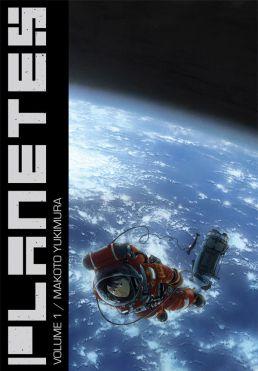
Title: Planetes
Genre: Science Fiction
Publisher: Kodansha (JP), Dark Horse Comics (US)
Creator: Makoto Yukimura
Serialized in: Weekly Morning
Original Release Date: December 22, 2015
Review copy provided by the publisher
I’ll admit that I wasn’t overly familiar with this story going in but from what I’d heard Planetes sounded like a series of loosely connected stories, focusing equally on three characters — Yuri, Fee, and Hachimaki — as they clean up space garbage. I expected a character driven, almost slice of life story in a science fiction setting, which turned out to be partially correct. It is a character driven story but it’s Hachi’s story; after just a couple of chapters (where it’s clear the the manga is trying to find its footing) the focus is almost exclusively on Hachi, with many chapters that don’t include Yuri, Fee, or latecomer Tanabe at all! The story isn’t precisely slice of life either; there’s a lot less garbage collecting than I expected and more ruminating on humanity, space, and the interstellar “world” of Earth less than a century from now.
This wouldn’t necessarily be a problem, but I just couldn’t warm up to Hachi and his struggles which end up being the bulk of this first omnibus volume. I really do like science fiction and the stories of people who aspire to travel amongst the stars; I’m a big fan of Space Brothers. But while I could find myself relating to Mutta and Hibito’s struggles (both Mutta’s struggles on Earth and Hibito’s PTSD) I felt pretty unsympathetic towards Hachi. Despite the many chapters he spends naval-gazing he seems to never move on from his current mindset, a mixture of nihilism, apathy, and a lack of self-care, and that lack of change effectively renders these chapters pointless. For all of the time spent in Hachi’s head I found it really hard to understand him, and I greatly preferred the chapters which focused more on the other characters.
Planetes also might not be the best story to read in an omnibus format since it makes the story feel as if it’s following a pattern. There’s terrorism, Hachi having an existential crisis of sorts, an outburst from someone near him trying to snap him out of it, and other repeated quirks that pop up everything three or four chapters, so it felt repetitive quickly. I’ll also admit that with the recent flare-ups in the Middle East seeing yet another group of terrorists where the “viewpoint” character is Middle Eastern makes me squirm. Creator Yukimura does try to address this in the story but instead only seems to highlight just how cliched that idea is, though admittedly this series ran from 1999-2004 so perhaps it was less cliched 15 years ago. That conflict in particular also encapsulated how the entire story is a mixture of both bright, shining hope for the future and how today’s present problems still cling to it and threaten to bring it all down. I do like the thought and detail put into the setting but there were some parts of it that felt off to me in a way I can’t quite explain.
Do I recommend this? I honestly don’t know. It’s not a bad story, but it’s one that I found myself having to slog through and this is a kind of story I normally enjoy! If you like science fiction that’s not about intergalactic conflicts then I do think you should give this a chance. Near-future science fiction isn’t explored enough in fiction and I did find many of the background events (like the upcoming Jupiter mission) to be really cool, and that’s what continued to hold my interest. If Hachi goes forward a bit more than I would have no problem recommending this series but as it stands, sci-fi fans should check this out but be prepared for a lot of philosophical conversations.

